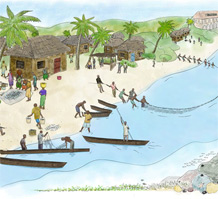
The project will investigate the relationships between ecosystems and human wellbeing.
Supporting poor communities through ecosystem services in Mozambique and Kenya
A new project led jointly by the University of Exeter and the Stockholm Resilience Centre has been awarded £1.9 million by Ecosystem Services for Poverty Alleviation (ESPA a joint programme of NERC, ESRC and DFID).
The project will investigate the relationships between ecosystems and human wellbeing with the goal of alleviating poverty and improving sustainable resource use in the poor coastal communities of Mozambique and Kenya.
Alongside thirty international partners from Kenya, Mozambique, the UK and Canada researchers from Exeter, led by Professors Katrina Brown and Chris Perry, will work collaboratively on this three year study which aims to have an enduring impact in the research locations and to inform policy through engagement with government, NGOs and donor agencies.
Professor Katrina Brown, from the University of Exeter’s Environment and Sustainability Institute said: “We aim for direct impact on the wellbeing of the poor inhabitants of the rapidly transforming coastal areas in Mozambique and Kenya. We also aim to provide indirect impact to coastal poor in other developing countries through our international impact strategy.”
The project will provide new insights into how ecosystems provide benefits for poor people and will involve communities in participatory processes such as scenarios exercises to identify more sustainable and equitable management strategies and key leverage points for policy. For example it will investigate how valuable conserving ecosystem services, such as reef fisheries and carbon sequestration by coastal mangroves can have positive impacts on poorest members of communities, such as women fish traders or landless farmers.
A thorough understanding of how changes to ecosystems impact communities will be crucial in developing effective methods to reduce poverty and provide enhanced social and cultural benefits.
Date: 20 May 2013
